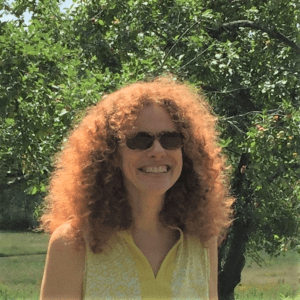603 Uniondale Avenue
Would I go there?
to what was once
a lot
of dirt along Uniondale, the avenue de l’avenir.
For a good year there after the Great War
my grandfather and his brothers worked:
Blueprints, concrete, joists to laths,
hammering up some beadboard heaven, beams
still with bark. Later came the claw-foot, glass knobs,
the porcelained flush
of indoor plumbing.
Oh, to go down that street.
Nana made it a museum,
open to the rare guest.
All of you lived in the cellar kitchen,
crouched like Van Gogh’s Potato Eaters,
where she led an apron-dishtowel life.
You were an only child.
After listening to the radio in rockers,
you came up the metal treaded stairs only to sleep
in the heavy air of lemon polish and mothballs.
Next door became a mortuary;
Nana kept the shades down
after seeing an arm broken to fit the box.
By the mid-seventies, we had to check on the place,
while Dad mowed, you turned on lights.
Resentful of the shot Saturday, I traced my name in the jar dust of hoarded peaches, cans of peas;
tap-danced on the linoleum,
kept talking to myself.
Nobody cooked anymore.
The wall calendar was always pumpkin-fall, 1963.
The smell of coal and stiff-hung laundry stayed on.
Would I go down that street again?
Hard left
to 603, the corner bungalow.
Brush the fringe of the Japanese maple,
sit in the rusted white iron chairs,
pick the windfall from the great pear
under which you buried your dog
that some bastard had skewered,
ivied-over bones,
ivy-over everybody
No; not now. I wouldn’t go down Jerusalem Avenue.
It leads to Walgreens: nature in brand name.
Before it was gone, I grabbed a few garage bricks,
after hours, always a coward.
I didn’t climb the stoop, try the door…
Foreign neighbors stared, thinking trespassing.
Forgive me everything.
And if so, then let’s you and I go
to first taste those baize-hard pears
then run the remembered meadows
insisting on butter and egg, blue thistle,
past the neighbor’s tethered cow,
back to the feral kittens
you once found under the garage woodpile.
• • •
Alias Writ Large
For Jean Moulin
Joseph-Jean Mercier,
a Chartres prefect, thrown into his own jail
for protecting Senegalese soldiers,
drew a line
with a glass shard against his throat.
Then a trilby, a scarf disguised the scar,
and made him into Max, the first alias.
Max,
posed as a patient in Dr. Dugojohn’s office;
Caluire was in full June bloom.
Did he look up from his doodling,
—the gold and tanned Antoinette of Nice again—
destined for his Romanin gallery,
before the black Citroens arrived,
and their boots hit the curb?
Romanin,
when Klaus Barbie asked for names,
he passed over the pen and paper.
Romanin drew his caricature,
smiling, slid back the sketch of a funny man.
That time torture made him over.
Rex,
they held up his bandaged bleeding head,
for a Lyons courtyard shave
before packing him off to die on a train to Metz.
Witnesses said only his eyes were alive.
Never a word drawn out of him.
It took twenty-one years before Malraux said something
to a Pantheon-platformed box
“…poor, unrecognizable face, his was the face of France…”
black crepe draped, billowing,
emptied of bones, of likenesses.
• • •
Nuevo Annunciation
I am walking proof
of visitation otherwise.
From white coats,
laden with samples and syringes,
come glad tidings in a tube.
Life, freeze-dried, for a price,
thaws in pregnant pause;
that’s all there is to it.
Now there need be no congress between us.
Our eyes avert; heart only afterthought.
All conjugal out the door—that’s the miracle.
Even those star-stricken shepherds
gossips all, don’t have to pass
in the halls; nor wise men truck
in the myrrh, the gold
the frankincensed rest—
Is the Lord, mine,
with me?
• • •
 Sharon Kennedy-Nolle, a graduate of Vassar College, holds an MFA. in poetry from the Writers’ Workshop and a Ph.D. in English from the University of Iowa. Her chapbook Black Wick was a semi-finalist for the 2018 Tupelo Snowbound Chapbook Contest. It has just been chosen as the 2020 Chapbook Editor’s Pick by Variant Literature Press for publication this year.
Sharon Kennedy-Nolle, a graduate of Vassar College, holds an MFA. in poetry from the Writers’ Workshop and a Ph.D. in English from the University of Iowa. Her chapbook Black Wick was a semi-finalist for the 2018 Tupelo Snowbound Chapbook Contest. It has just been chosen as the 2020 Chapbook Editor’s Pick by Variant Literature Press for publication this year.
Her poetry has appeared or is upcoming in a variety of print and online journals.
Her dissertation was published as Writing Reconstruction: Race, Gender, and Citizenship in the Postwar South (UNC, 2015).
She lives and teaches in New York.